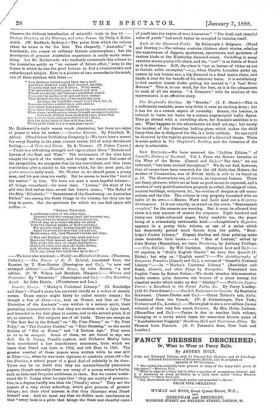Praed's Essays. " Morley's Universal Library." (G. Routledge and Sons.)—Praed's
name has survived chiefly as a writer of society verses. These essays might fairly be called society essays ; for though a few of them—e.g., that on Homer, and that on "The Divinities of the Ancients"—are written in a serious spirit, their prevailing characteristic is that they are written with a light hand, and intended in the first place to amuse, and in the second place, if at all, to instruct. The subjects are of all kinds. There are essays on "The Best Bat in the School," on "My First Flame," on "My First Folly," on "The Country Curate," on "Hair-Dressing," on the social fictions of "Not at Home," and "A Certain Age." They seem to us to be unequal. Some of them, we are bound to say, are dull. Sir G. Young, Praed's nephew, and Professor Morley have both contributed a few introductory sentences, from which we learn that Praed was born in 1802, and left Eton in 1821. The greater number of these papers were written while be was still at Eton—i.e., when be was some eighteen or nineteen years old—for the Etonian, a school paper of a good deal of celebrity in its time. There can be no doubt that they are extraordinarily precocious papers, though naturally there are many of a young writer's faults, each as false and frequent antitheses, in them. But we cannot under- stand Sir G. Young when he says that "they are worthy of preserva- tion, in a degree hardly less than his [Praed's] verse." They are the papers of a very clever schoolboy, which give promise of greater things ; but their chief interest is that they illustrate what Praed himself was. And we must say that we dislike such sentiments as that "every book is a prize that brings the fresh and cheerful voice
of youth into the region of true Literature." "The freeh and cheerful voice of youth" had much better be occupied in training itself.






















































 Previous page
Previous page